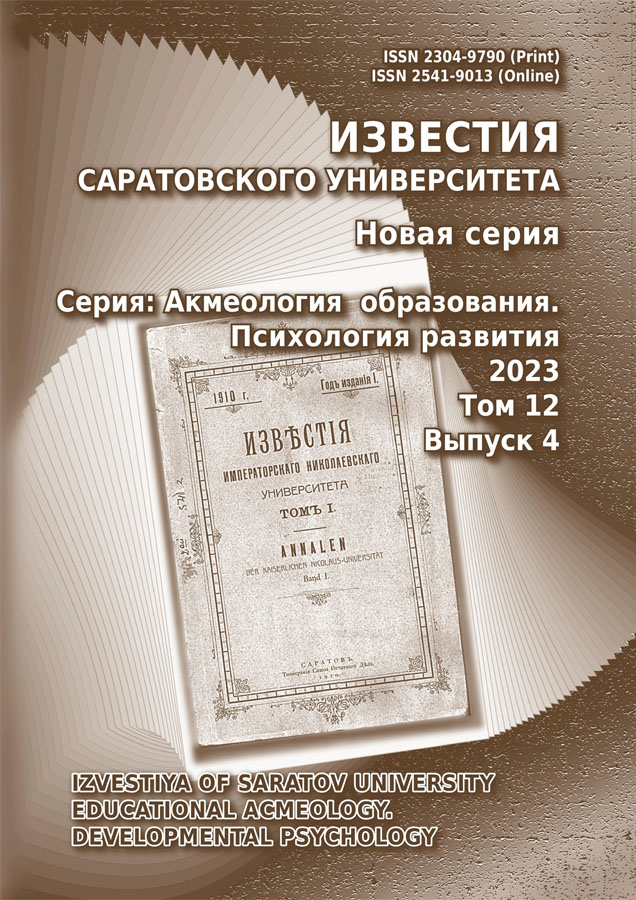Educational needs of the Generation Alpha
- Authors: Danilova L.N.1
-
Affiliations:
- Yaroslavl State Pedagogical University
- Issue: Vol 12, No 1 (2023)
- Pages: 58-67
- Section: Articles
- URL: https://journal-vniispk.ru/2304-9790/article/view/251069
- DOI: https://doi.org/10.18500/2304-9790-2023-12-1-58-67
- EDN: https://elibrary.ru/BMYWMV
- ID: 251069
Cite item
Full Text
Abstract
The relevance of the study is determined by the needs of current science and practice in understanding the contemporary generation of children. Nowadays, they state that after Generation Z, which was considered to be contemporary, since about 2010, there have been born children of a new generation, somewhat diff erent from Generation Z in terms of life-sustaining activity and general characteristics. The article develops a discussion on the problem of Generation Alpha in order to address the issue of its education. It is a signifi cant question since the majority of this cohort are already included in the system of preschool and primary education. The purpose of the study is to identify modern challenges to the educational system that arise under the infl uence of the new generation’s characteristics. In accordance with this, one of the objectives of the study was to determine psychological and pedagogical features of Generation Alpha. The methodological base of the research is the generational approach to the study of children’s behavior and education. The results of the study show that Generations Alpha and Z diff er due to the greater infl uence of modern technologies on culture: Alpha is the fi rst generation, living in a digital environment from their birth. They learn to interact with digital devices at an early age (often before their language development). It has been reveiled that this condition determines the specifi cs of Alpha children as a generation. By means of theoretical and empirical methods, the study has proved that the most typical features of Generation Alpha are creativity, curiosity, striving for leadership, activity and interest in the social agenda. However, a number of alarming characteristic have been singled out: excessive self-confi dence, increased excitability, and the rejection of rules. The research shows that that these features and life in the digital environment explain Alpha’s needs in education. The results reveal some problems in coonection with the solution of the arising challenges (philosophical, material and fi nancial, personnel, and methodological).
References
- Strauss W., Howe N. Gen erations. New York : Harper Perennial, 1991. 318 p.
- Mannheim K. Das Problem der Generationen // Kölner Vierteljahreshefte für Soziologie. 1928. Jg. 7, H. 2. S. 157–185.
- Becker H. Dynamics of Cohort and Generations Research. Amsterdam : Thesis Publishers, 1992. 656 p.
- Радаев В. В. Миллениалы на фоне предшествующих поколений: эмпирический анализ // Социологические исследования (Социс). 2018. № 3. С. 15–33. 10.7868/S0132162518030029' target='_blank'>https://doi: 10.7868/S0132162518030029
- Шамис Е., Никонов Е. Теория поколений. Необыкновенный Икс. М. : Sуnergy Book, 2020. 192 с.
- Drugaş М. Screenagers or “Screamagers”? Current perspectives on Generation Alpha // Psychological thought. 2022. Vol. 15, no. 1. Р. 1–11. 10.37708/psyct.v15i1.732' target='_blank'>https://doi: 10.37708/psyct.v15i1.732
- McCrindle M., Fell A. Generation Alpha. London : Headline Publishing Group, 2021. 352 р.
- Sladek S., Grabinger A. Gen Z: The fi rst generation of the 21st Century has arrived! Minnesota : XYZ University, 2018. 16 р.
- Francis T., Hoefel F. ‘True Gen’: Generation Z and its implications for companies // Consumer Packaged Goods. 2018. Vol. 1, no. 1. Р. 1–10.
- Bencsik A., Horváth-Csikós G., Juhász T. Y and Z Generations at workplaces // Journal of Competitiveness. 2016. Vol. 8, no. 3. P. 90–106. https://doi.org/0.7441/joc.2016.03.06
- Feiertag J., Berge Z. L. Training Generation N: how educators should approach the Net Generation // Education+Training. 2008. Vol. 50, no. 6. Р. 457–464. https://doi.org/10.1108/00400910810901782
- Woodman D. Generational change and intergenerational relationships in the context of the asset economy // Distinktion: Journal of Social Theory. 2022. Vol. 23, no. 1. Р. 55–69. https://doi.org/10.1080/1600910X.2020.1752275
- Turk V. Understanding Generation Alpha. London : Hotwire Consulting, 2017. 21 р.
- % детей начинают пользоваться гаджетами ещё в дошкольном возрасте. Hi-Tech.Mail.Ru. 2015. 18 июня. URL: https://hi-tech.mail.ru/news/ (дата обращения: 15.09.2022)
- The future's bright: The future's Gen Alpha. Beano Studios, 2019, Jun 20. URL: https://beanobrain.com (дата обращения: 15.09.2022).
- Bonchiș E. Generation Alpha. A great challenge for parents and teachers // Parenting from A to Z. 83 Challenging Themes for Today’s Parents / ed. G. Pânișoară. Iași : Polirom, 2022. Р. 125–131.
- Generation ALPHA: Preparing for the future consumer. Wunderman Thompson Commerce, 2019. 24 р. URL: https://gertkoot.files.wordpress.com/2019/10/wtcgeneration-alpha-2019.pdf (дата обращения: 14.09.2022).
- Jha A. K. Understanding Generation Alpha // OSF Preprints. 2020. June 20. Р. 1–12. 10.31219/osf.io/d2e8g' target='_blank'>https://doi: 10.31219/osf.io/d2e8g
- Gen Alpha: Generation Infi nite // Cassandra. 2022. July 11. URL: https://cassandra.co/ (дата обращения: 17.09.2022)
- Putri W. T. A., Umah R. Y. H. The improving of higherorder thinking skills as information fi lter for Alpha Generation // Al-Bidayah: Jurnal Pendidikan Dasar Islam. 2020. Vol. 12, no. 1. Р. 125–138. https://doi.org/10.14421/al-bidayah.v12i1.341
- Gomes Carneir C., De Velo Bezerra F., Oste G., Cremonezi G., Reis T. A., Graziano G. O. Study on the Alpha Generation and the refl ections of its behavior in the organizational environment // Quest Journals. Journal of Research in Humanities and Social Science. 2018. Vol. 5, no. 6. Р. 9–19.
- Carter C. M. The complete guide to Generation Alpha. The children of Millennials // Forbes. 2016. Vol. 21. December. Р. 74‒76.
- Apaydin Ç., Kaya F. An analysis of the preschool teachers’ views on Alpha Generation // European Journal of Education Studies. 2020. Vol. 6, no. 11. Р. 123–141. https://doi.org/10.46827/ejes.v0i0.2815
- Barkowitz D. 13 Things to know about the Alpha Generation // Adage. 2016. January 28. URL: https://adage.com/article/digitalnext/13-things-alpha-generation/302366 (дата обращения: 02.05.2022)
- Фомичева Е. Е. Виртуальные лабораторные работы в дистанционном обучении физике // Мир науки, культуры, образования. 2022. № 1 (92). С. 64–69. https://doi.org/10.24412/1991-5497-2022-192-64-69
- Rusman N. S., Ismail H. N., Syed Jaafar S. M. R. Demand of preschool education by Alpha generation on edutainment leisure in the city // International Journal of Built Environment and Sustainability. 2019. Vol. 6, no. 1-2. P. 121–128. https://doi.org/10.11113/ijbes.v6.n1-2.391
Supplementary files










